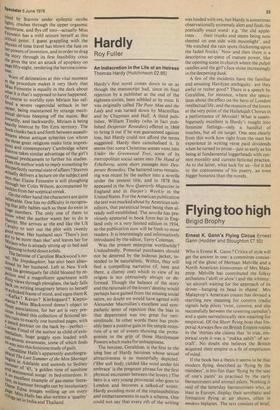Hardly
Roy Fuller
An indiscretion in the Life of an Heiress Thomas Hardy (Hutchinson £2.95) Hardy's first novel comes down to us as though the manuscript had, since its final rejection by a publisher at the end of the eighteen-sixties, been nibbled at by mice. It was originally called The Poor Man and the Lady and was turned down by Macmillan and by Chapman and Hall. A third publisher, William Tinsley (who in fact pub
lished Desperate Remedies) offered in 1869 to bring it out if he was guaranteed against loss, but Hardy could not afford the terms suggested. Hardy then cannibalised it. It seems that some Christmas scenes went into Under the Greenwood Tree, some of its metropolitan social satire into The Hand of Ethelberta, some short passages into Desperate Remedies. The battered torso remaining was recast by the author into a novella under the present title, and in 1878 this appeared in the New Quarterly Magazine in England and in Harper's Weekly in the United States. For the American publication the text was mucked about by American subeditors, that parasitical breed being then already well-established. The novella has previously appeared in book form but in England only in a very limited edition in 1934, so the publication now will be fresh to most readers. It is interestingly and informatively introduced by the editor, Terry Coleman.
Was the present enterprise worthwhile? Undoubtedly. Potential purchasers should not be deterred by the hideous jacket, intended to be naturalistic. Within, they will find a compelling narrative (if, here and there, a clumsy one) which in view of its origins is not obtrusively abrupt or deformed. Though the balance of the story and the rationale of the lovers' destiny would perhaps have gained from the missing social satire, no doubt we would have agreed with Alexander Macmillan's excellent and sympathetic letter of rejection that the bias in that department was too great for verisimilitude. In other words there has probably been a positive gain in the simple retention of a set of events showing the protagonists in the grip of those Hardyesque Powers which make for unhappiness.
The heroine, Geraldine, is the first in the long line of Hardy heroines whose sexual attractiveness is so masterfully depicted. ('Her soft body yielded like wool under his embrace' is the pregnant phrase for the first physical encounter between the lovers.) The hero is a very young provincial who goes to London and becomes a talked-of writer, Hardy avoiding most of the implausibilities and embarrassments in such a schema. One could not say that every rift of the writing was loaded with ore, but Hardy is sometimes observationally extremely alert and finds the poetically exact word : e.g. 'the old appletrees. . . their trunks and stems being now sheeted on one side with moonlight', and 'He watched the rain spots thickening upon the faded frocks.' Now and then there is a descriptive set-piece of mature power, like the opening scene in church where the pulpit candles and the girl's face shine increasingly in the deepening dusk.
A few of the incidents have the familiar and amusing Hardyan ambiguity : are they awful or rather good ? There is a speech by Geraldine, for instance, where she speculates about the effect on the hero of London intellectual life; and the reunion of the lovers at the very point of the Hallelujah Chorus in a performance of Messiah! What is unambiguously excellent is Hardy's insight into feminine feelings—only a handful of touches, but all on target. One sees clearly from this work how right from the start his experience in writing verse paid dividends when he turned to prose—just as early as his being at fundamental loggerheads with current morality and current fictional practice. As to the latter, what luck for us—for it led to the copiousness of his poetry, an even bigger bonanza than the novels.


































 Previous page
Previous page